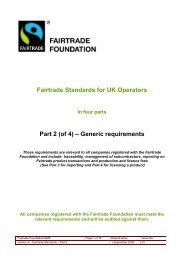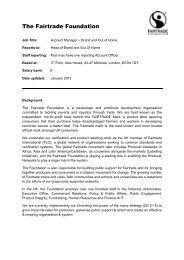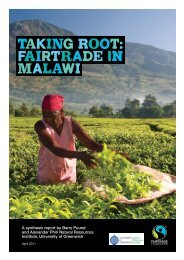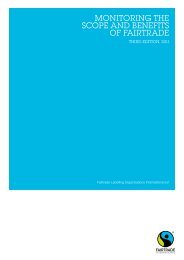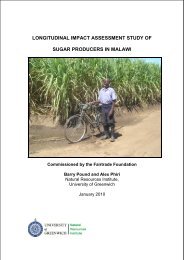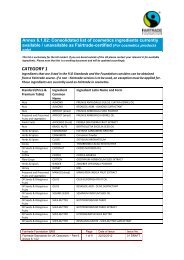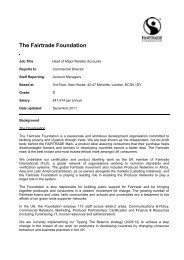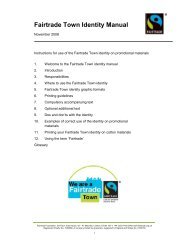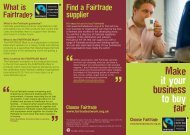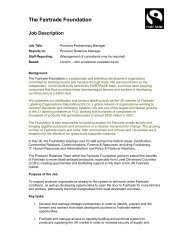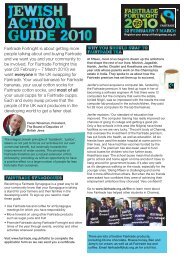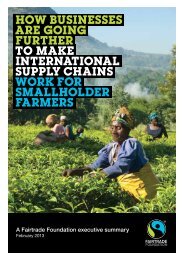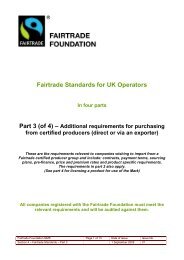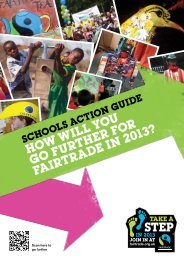Fairtrade and Coffee Report 2012 - The Fairtrade Foundation
Fairtrade and Coffee Report 2012 - The Fairtrade Foundation
Fairtrade and Coffee Report 2012 - The Fairtrade Foundation
Create successful ePaper yourself
Turn your PDF publications into a flip-book with our unique Google optimized e-Paper software.
Figure 11: <strong>Fairtrade</strong> coffee Producer organisations<br />
(Pos) <strong>and</strong> members by region 2011<br />
Region POs Members<br />
Africa 32 294,000<br />
Latin America 268 192,000<br />
& Caribbean<br />
Asia & Oceania 29 46,000<br />
Total 329 532,000<br />
Source: FLO<br />
<strong>Fairtrade</strong> certified coffee is grown on a total of 718,000<br />
hectares. <strong>The</strong> average coffee plot is 1.5ha – ranging<br />
from less than 0.9ha in Africa <strong>and</strong> Asia to 2.9ha in<br />
South America. Producer organisations sold 103,000<br />
tonnes of <strong>Fairtrade</strong> coffee in 2009/10, up 6 per cent on<br />
the previous year.<br />
<strong>The</strong>se sales generated €17.5m in <strong>Fairtrade</strong> Premium,<br />
a 30 per cent growth from €13.5m in 2008. Almost<br />
60 per cent was invested equally in business<br />
development <strong>and</strong> production <strong>and</strong> processing at farm<br />
level. <strong>The</strong> remainder was spent on a range of health,<br />
education <strong>and</strong> community projects.<br />
Figure 12: <strong>Fairtrade</strong> coffee exports by country<br />
2009/10<br />
Total 103,000 tonnes<br />
Source: FLO<br />
Figure 13: <strong>Fairtrade</strong> exports by top five countries<br />
2009/10<br />
Country Tonnes<br />
Peru 26, 300<br />
Colombia 11,000<br />
Nicaragua 9,500<br />
Mexico 9,000<br />
Honduras 8,600<br />
Others 38,600<br />
Total 103,000<br />
Source: FLO<br />
5. fairtrade coffee sales<br />
5.1 Is <strong>Fairtrade</strong> coffee changing the<br />
mainstream uK market?<br />
<strong>Fairtrade</strong> pioneers sustainable coffee<br />
Effective campaign strategies in recent years have<br />
exposed problems in commodity supply chains<br />
in developing countries, highlighting issues from<br />
workers’ rights, child labour <strong>and</strong> climate change to<br />
the impact of production on local communities <strong>and</strong><br />
the environment. As a result, consumers in Europe<br />
<strong>and</strong> the US are increasingly aware of the impact of<br />
coffee production on producers <strong>and</strong> the environment<br />
<strong>and</strong> have a growing expectation that companies<br />
Ethiopia 4%<br />
Tanzania 4%<br />
Costa Rica 4%<br />
Indonesia 5%<br />
Brazil 5%<br />
Guatemala 7%<br />
Honduras 8%<br />
demonstrate their products have been ethically <strong>and</strong><br />
responsibly produced. In a recent survey 41 over 80 per<br />
cent of UK consumers said companies should protect<br />
the environment <strong>and</strong> ensure farmers <strong>and</strong> workers are<br />
paid fairly <strong>and</strong> have safe working conditions.<br />
<strong>Fairtrade</strong> was the first labelling scheme in the<br />
coffee sector, launched in 1988, with the objective<br />
of empowering producers to trade their way out of<br />
poverty. <strong>Fairtrade</strong> is unique in providing a minimum<br />
price that covers costs of sustainable production<br />
<strong>and</strong> acts as a safety net when prices fall below a<br />
sustainable level. Rainforest Alliance <strong>and</strong> IFOAM<br />
41 GlobeScan June 2011<br />
Others<br />
10%<br />
Nicaragua<br />
9%<br />
Mexico 9%<br />
22 <strong>Fairtrade</strong> <strong>and</strong> <strong>Coffee</strong><br />
Peru<br />
25%<br />
Colombia<br />
11%



